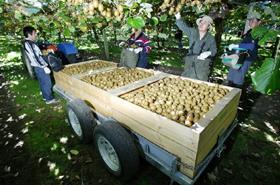
Looming class action against New Zealand’s Ministry for Primary Industries (MPI) continues to divide the country’s kiwifruit sector, with leading post-harvest operator Seeka Kiwifruit Industries joining the yet-to-be-filed High Court claim.
In a release issued over the weekend (4 October), Seeka said it had listened to ensuing debate and taken time to consider its position on the claim, which alleges Biosecurity NZ, a division of MPI, was liable for the outbreak of the Psa vine killing disease in 2010.
The growers who have established the claim, being dubbed the Kiwifruit Cliam, are believed to be seeking over NZ$880m in compensation. Seeka “conservatively” estimated that it lost over NZ$45m as a result of Psa.
“Many growers have incurred significant financial losses in addition to emotional and psychological stress,” Seeka chief executive Michael Franks outlined in the company statement. “Having fully considered the financial and human impacts on Seeka and its people of the alleged biosecurity breach and the loss of wealth by our shareholders; Seeka has taken the decision to join the class action. Seeka considers the right place for the issue to be considered is in the Courts rather than under the vines. Seeka has seen the legal opinions both for and against and offers no opinion on their merits other than to say, in our opinion; there is merit in having them tested.”
Franks said the company chose to state its position after becoming aware of inaccurate statements regarding Seeka circulating in the Industry.
No support from NZKGI
The stance is at odds with the advice given to growers last week by New Zealand Kiwifruit Growers Incorporated (NZKGI).
The peak representative body said it would not join the claim until it had conducted a full review of the agreement growers were being asked to sign. It encouraged all members to follow suit.
Seeka’s largest rival in the kiwifruit post harvest sector, Eastpak, has also publically refused to support the proposed court action.
“The EastPack Board position is that the action proposed has the potential to adversely affect Government and public attitudes that could prejudice the kiwifruit industry structure,” Eastpak chairman Ray Sharp told Fairfax Media. “This structure has huge value for our industry, its growth potential and New Zealand's export earnings growth.”
McBride's concern
Sharp’s sentiment shared by Zespri chairman Peter McBride, who has raised grave concerns about the disharmony legal action could bring to the sector.
“The last thing this industry needs right now is for the focus to be taken from growing our industry, and placed on a divisive, drawn out, and hugely expensive legal battle, especially given the poor process followed by ‘The Kiwifruit Claim’ and the uncertain legal basis of the case,” McBride explained. “ I believe that the industry will prosper by working with the Government, not against it.”
The Independent Kiwifruit Growers Association (IKGA), a Bay of Plenty-based grower group who has publically raised its discontent with the management of Zespri’s single desk model, took umbrage with these claims.
In a press release issued on Sunday (5 October), the IKGA alleged McBride’s statements were ill judged and premature.
“All he has done is to force industry participants to take sides on the issue which seems to be something that he apparently fears,” the IKGA stated. 'IKGAlooks forward to seeing the Kiwifruit Claim progress for the benefit of growers and the national interest.'



